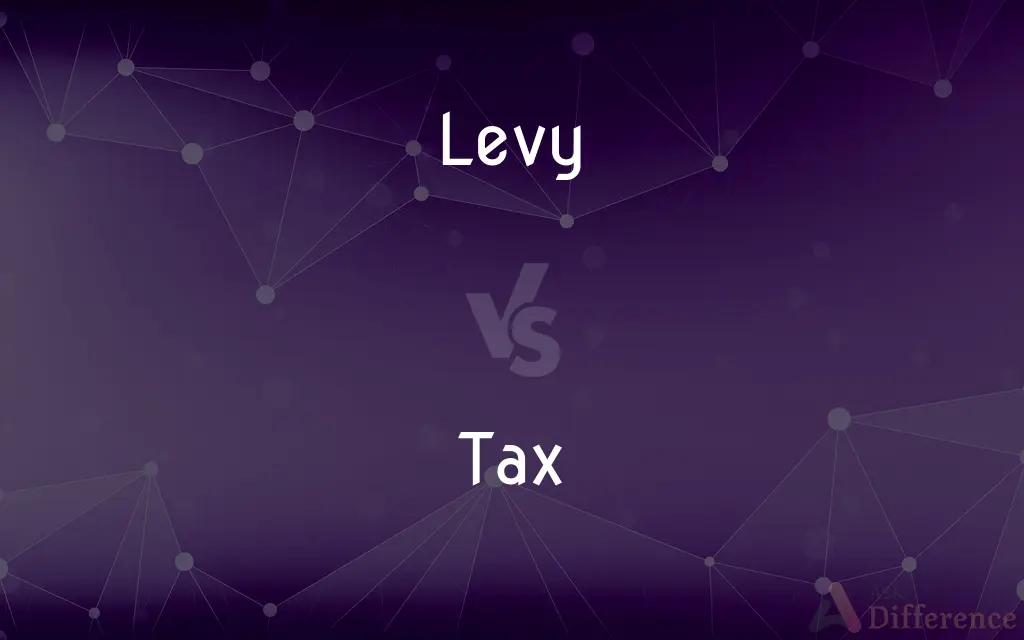Levy vs. Tax — What's the Difference?
By Tayyaba Rehman — Updated on October 25, 2023
A levy is the act of imposing or collecting, often by legal authority, while a tax is a compulsory payment to the government for its support.

Difference Between Levy and Tax
Table of Contents
ADVERTISEMENT
Key Differences
Levy is a term that essentially means to impose or collect, and it can refer to various types of charges or fees. When a government or institution levies a fee, it's enforcing collection. Tax, however, specifically denotes a compulsory financial charge imposed by the government on individuals or entities to fund public expenditures.
Levy has a broader application. It can be applied in contexts outside of government revenue collection. For instance, organizations might levy fines or penalties for rule violations. Tax, conversely, is a specific type of levy primarily associated with governmental financial demands on its citizens.
Levy also carries a connotation of immediacy or urgency. For example, a levy might be imposed suddenly in response to specific circumstances or needs. Tax, while it can change or be introduced anew, often follows a more regular, predictable pattern, such as annual property taxes.
The term Levy can also be used as a verb, indicating the act of imposing or collecting. You might hear about a government deciding to levy additional charges on imports. Tax, although also usable as a verb, is more commonly seen as a noun, representing the actual charge itself.
Both Levy and Tax serve as means for authorities or organizations to generate revenue or control behavior. However, while every tax is a levy (since it's imposed and collected), not every levy is a tax, as levies can encompass a wider range of charges and fees.
ADVERTISEMENT
Comparison Chart
Definition
Act of imposing or collecting, often by authority.
Compulsory payment to the government for its support.
Usage
Broader; can refer to various charges or fees.
Specific to governmental financial demands.
Connotation
Can imply immediacy or urgency.
Often more regular and predictable.
Grammar
Used as both noun and verb.
Primarily used as a noun, but can also be a verb.
Scope
All taxes are levies, but not all levies are taxes.
A specific type of levy.
Compare with Definitions
Levy
Impose (a tax, fee, or fine)
A tax of two per cent was levied on all cargoes
Tax
Mandatory contribution to state revenue.
Everyone has to pay their income tax.
Levy
Act of imposing a fee or charge.
The council decided on a levy for road maintenance.
Tax
Financial charge imposed by the government.
The new luxury tax affected high-end products.
Levy
Raising or collecting by authority or force.
The kingdom levied troops for the upcoming war.
Tax
To assess or determine a financial charge.
The government decided to tax sugary drinks.
Levy
An amount collected or imposed as a charge.
The import levy significantly increased the cost of foreign goods.
Tax
A tax is a compulsory financial charge or some other type of levy imposed on a taxpayer (an individual or legal entity) by a governmental organization in order to fund government spending and various public expenditures. A failure to pay, along with evasion of or resistance to taxation, is punishable by law.
Levy
Enlist (someone) for military service
He sought to levy one man from each vill for service
Tax
A compulsory contribution to state revenue, levied by the government on workers' income and business profits, or added to the cost of some goods, services, and transactions
A tax bill
Higher taxes will dampen consumer spending
A tax on fuel
Tax cuts
They will have to pay tax on interest earned by savings
Levy
An act of levying a tax, fee, or fine
Police forces receive 49 per cent of their funding via a levy on the rates
Tax
A strain or heavy demand
A heavy tax on the reader's attention
Levy
An act of enlisting troops
Edward I and Edward II had made substantial use of the feudal levy for raising an army
Tax
Impose a tax on (someone or something)
The income will be taxed at the top rate
Levy
To impose (a tax or fine, for example) on someone.
Tax
Make heavy demands on (someone's powers or resources)
She knew that the ordeal to come must tax all her strength
Levy
To impose a tax, fine, or other punishment on (a person or business).
Tax
Confront (someone) with a fault or wrongdoing
Why are you taxing me with these preposterous allegations?
Levy
To enlist or conscript into military service
Levy recruits.
Tax
Examine and assess (the costs of a case)
An officer taxing a bill of costs
Levy
To declare and wage (a war).
Tax
A contribution for the support of a government required of persons, groups, or businesses within the domain of that government.
Levy
To confiscate property, especially in accordance with a legal judgment.
Tax
A fee or dues levied on the members of an organization to meet its expenses.
Levy
The act or process of levying.
Tax
A burdensome or excessive demand; a strain.
Levy
Money, property, or troops levied.
Tax
To place a tax on (income, property, or goods).
Levy
To impose (a tax or fine) to collect monies due, or to confiscate property.
To levy a tax
Tax
To exact a tax from
Taxed the people.
Levy
To raise or collect by assessment; to exact by authority.
Tax
(Law) To assess (court costs, for example).
Levy
To draft someone into military service.
Tax
To make difficult or excessive demands upon
A boss who taxed everyone's patience.
Levy
To raise; to collect; said of troops, to form into an army by enrollment, conscription. etc.
Tax
To accuse; confront
Taxed him with ingratitude.
Levy
To wage war.
Tax
To hold accountable
The contractor was taxed with the mistake of the subcontractor.
Levy
To raise, as a siege.
Tax
Money paid to the government other than for transaction-specific goods and services.
Levy
(legal) To erect, build, or set up; to make or construct; to raise or cast up.
Tax
A burdensome demand.
A heavy tax on time or health
Levy
The act of levying.
Tax
A task exacted from one who is under control; a contribution or service, the rendering of which is imposed upon a subject.
Levy
The tax, property or people so levied.
Tax
(obsolete) charge; censure
Levy
The Spanish real of one eighth of a dollar, valued at elevenpence when the dollar was rated at seven shillings and sixpence.
Tax
(transitive) To impose and collect a tax from (a person or company).
Some think to tax the wealthy is the fairest.
Levy
A name formerly given in Pennsylvania, Maryland, and Virginia to the Spanish real of one eighth of a dollar (or 12½ cents), valued at eleven pence when the dollar was rated at 7s. 6d.
Tax
(transitive) To impose and collect a tax on (something).
Some think to tax wealth is destructive of a private sector.
Levy
The act of levying or collecting by authority; as, the levy of troops, taxes, etc.
A levy of all the men left under sixty.
Tax
(transitive) To make excessive demands on.
Do not tax my patience.
Levy
That which is levied, as an army, force, tribute, etc.
Tax
(transitive) To accuse.
Levy
The taking or seizure of property on executions to satisfy judgments, or on warrants for the collection of taxes; a collecting by execution.
Tax
(transitive) To examine accounts in order to allow or disallow items.
Levy
To raise, as a siege.
Tax
A charge, especially a pecuniary burden which is imposed by authority.
Levy
To raise; to collect; said of troops, to form into an army by enrollment, conscription, etc.
Augustine . . . inflamed Ethelbert, king of Kent, to levy his power, and to war against them.
Tax
A charge or burden laid upon persons or property for the support of a government.
A farmer of taxes is, of all creditors, proverbially the most rapacious.
Levy
To raise or collect by assessment; to exact by authority; as, to levy taxes, toll, tribute, or contributions.
If they do this . . . my ransom, then,Will soon be levied.
Tax
A task exacted from one who is under control; a contribution or service, the rendering of which is imposed upon a subject.
Levy
To gather or exact; as, to levy money.
Tax
Especially, the sum laid upon specific things, as upon polls, lands, houses, income, etc.; as, a land tax; a window tax; a tax on carriages, and the like.
Levy
To seize property, real or personal, or subject it to the operation of an execution; to make a levy; as, to levy on property; the usual mode of levying, in England, is by seizing the goods.
Tax
A disagreeable or burdensome duty or charge; as, a heavy tax on time or health.
Levy
A charge imposed and collected
Tax
A sum imposed or levied upon the members of a society to defray its expenses.
Levy
The act of drafting into military service
Tax
Charge; censure.
Levy
Impose and collect;
Levy a fine
Tax
A lesson to be learned; a task.
Levy
Cause to assemble or enlist in the military;
Raise an army
Recruit new soldiers
Tax
To subject to the payment of a tax or taxes; to impose a tax upon; to lay a burden upon; especially, to exact money from for the support of government.
We are more heavily taxed by our idleness, pride, and folly than we are taxed by government.
Levy
Collection of an amount due.
The bank put a levy on his account for unpaid debts.
Tax
To assess, fix, or determine judicially, the amount of; as, to tax the cost of an action in court.
Levy
An assessment or fine.
The company faced a levy for environmental violations.
Tax
To charge; to accuse; also, to censure; - often followed by with, rarely by of before an indirect object; as, to tax a man with pride.
I tax you, you elements, with unkindness.
Men's virtues I have commended as freely as I have taxed their crimes.
Fear not now that men should tax thine honor.
Tax
Charge against a citizen's person or property or activity for the support of government
Tax
Levy a tax on;
The State taxes alcohol heavily
Clothing is not taxed in our state
Tax
Set or determine the amount of (a payment such as a fine)
Tax
Use to the limit;
You are taxing my patience
Tax
Make a charge against or accuse;
They taxed him failure to appear in court
Tax
A strain or heavy demand.
The long journey was a tax on his strength.
Tax
A burdensome charge or responsibility.
The responsibilities of leadership can be a heavy tax on anyone.
Common Curiosities
What does Levy primarily mean?
Levy refers to the act of imposing or collecting a fee or charge.
Can Levy also refer to raising troops?
Yes, "to levy troops" means to raise or gather them for service.
Is Tax always related to money?
Primarily, but "tax" can also mean a strain or heavy demand.
Is every Tax a Levy?
Yes, every tax is a type of levy, but not vice versa.
How does Tax differ from other levies?
Tax is a specific, compulsory payment to the government.
How do governments use taxes?
Governments use taxes to fund public expenditures.
Can Levy be used in non-governmental contexts?
Yes, organizations might levy fines or penalties.
Are taxes always predictable?
While taxes often follow regular patterns, they can change or be introduced anew.
What's the primary purpose of a Tax?
To generate revenue for the government.
Does a Levy always require legal backing?
Typically, levies have some authority backing, but the context defines its nature.
Can a bank levy an account?
Yes, banks can levy accounts for unpaid debts.
Can the act of imposing a tax be described as levying?
Yes, you can say the government levies a tax.
Can a levy be sudden?
Yes, levies can be imposed suddenly in specific circumstances.
Are taxes voluntary?
No, taxes are compulsory payments.
Which term has a broader application, Levy or Tax?
Levy has a broader application, encompassing various charges and fees.
Share Your Discovery

Previous Comparison
Penultimate vs. Ultimate
Next Comparison
Beautiful vs. HandsomeAuthor Spotlight
Written by
Tayyaba RehmanTayyaba Rehman is a distinguished writer, currently serving as a primary contributor to askdifference.com. As a researcher in semantics and etymology, Tayyaba's passion for the complexity of languages and their distinctions has found a perfect home on the platform. Tayyaba delves into the intricacies of language, distinguishing between commonly confused words and phrases, thereby providing clarity for readers worldwide.
















































